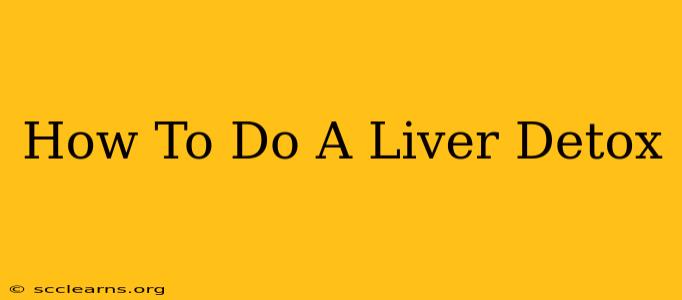The liver, our unsung hero, works tirelessly to filter toxins from our blood. But with daily exposure to environmental pollutants, processed foods, and alcohol, it can become overworked and sluggish. This can manifest in various ways, from fatigue and digestive issues to skin problems and hormonal imbalances. While there's no quick-fix "liver cleanse" that magically removes all toxins, supporting your liver's natural detoxification processes is crucial for overall well-being. This guide explores safe and effective ways to perform a liver detox, focusing on lifestyle changes and dietary adjustments.
Understanding Liver Detoxification
Before we dive into specific methods, it's important to grasp how the liver naturally detoxifies. The liver uses a two-phase process:
- Phase 1: Toxins are modified into less harmful substances.
- Phase 2: These modified substances are then conjugated (combined with other molecules) to make them water-soluble, allowing them to be excreted through urine or stool.
Supporting both phases is key to optimizing liver function. This isn't about "flushing" toxins, but about enhancing the liver's natural ability to process them.
How To Support Your Liver Naturally: A Step-by-Step Approach
Here's a practical approach to supporting your liver health:
1. Prioritize a Healthy Diet
What to Include:
- Cruciferous Vegetables: Broccoli, cauliflower, kale, and Brussels sprouts contain compounds that support Phase 2 detoxification.
- Leafy Greens: Spinach, kale, and collard greens are packed with vitamins and antioxidants that protect the liver.
- Garlic and Onions: These contain sulfur compounds that aid liver detoxification.
- Beets: Rich in betalains, powerful antioxidants that support liver health.
- Citrus Fruits: Excellent sources of vitamin C, which aids in detoxification.
- Avocado: Healthy fats support liver function and nutrient absorption.
What to Limit or Avoid:
- Processed Foods: High in unhealthy fats, additives, and preservatives that stress the liver.
- Excessive Sugar: Contributes to fatty liver disease.
- Alcohol: Overconsumption is extremely damaging to the liver.
- Refined Carbohydrates: White bread, pasta, and pastries can lead to inflammation and hinder liver function.
- Saturated and Trans Fats: These increase the risk of fatty liver disease.
2. Stay Hydrated
Water is crucial for flushing toxins from the body. Aim for at least eight glasses of water per day.
3. Manage Stress
Chronic stress can negatively impact liver health. Incorporate stress-reducing activities into your routine, such as yoga, meditation, or spending time in nature.
4. Get Enough Sleep
Sleep deprivation hinders the body's natural detoxification processes. Aim for 7-9 hours of quality sleep each night.
5. Exercise Regularly
Regular physical activity supports overall health, including liver function.
6. Consider Supplements (with Caution)
Some supplements, such as milk thistle and turmeric, have been traditionally used to support liver health. However, always consult your doctor before taking any supplements, especially if you have underlying health conditions or are taking medications. They can interact negatively with your current health status and medications.
When to Consult a Doctor
While these strategies can significantly support liver health, it's crucial to consult a doctor if you experience any signs of liver problems, such as:
- Yellowing of the skin or eyes (jaundice)
- Persistent fatigue
- Abdominal pain
- Swelling in the legs or ankles
- Dark urine
- Light-colored stools
Remember, a "liver detox" isn't a magic bullet. A healthy lifestyle that incorporates these recommendations is far more effective in supporting your liver's natural ability to detoxify and maintain optimal health. Always prioritize a holistic approach and seek professional medical advice when needed.

